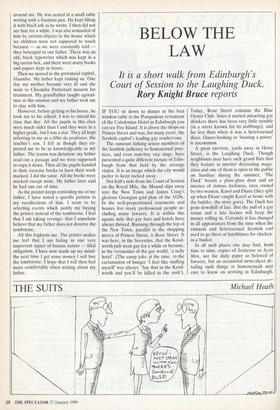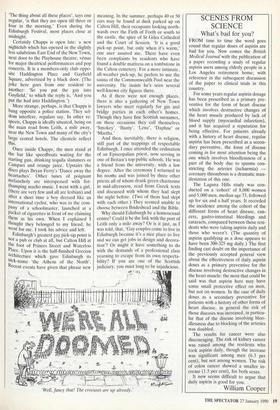BELOW THE LAW
It is a short walk from Edinburgh's Court of Session to the Laughing Duck.
Rory Knight Bruce reports
IF YOU sit down to dinner at the best window table in the Pompadour restaurant of the Caledonian Hotel in Edinburgh you can see Fire Island. It is above the shops on Princes Street and was, for many years, the Scottish capital's leading gay rendezvous.
The rumours linking senior members of the Scottish judiciary to homosexual prac- tices, and even rent-boy vice rings, have presented a quite different picture of Edin- burgh from that held by the average visitor. It is an image which the city would prefer to keep tucked away.
Not half a mile from the Court of Session on the Royal Mile, the Mound slips away into the New Town and James Craig's glorious Georgian grid plan of the 1820s. In the well-proportioned tenements and houses live many professional people in- cluding many lawyers. It is within this square mile that gay bars and hotels have always thrived. Running through the top of the New Town, parallel to the shopping mecca of Princes Street, is Rose Street. It was here, in the Seventies, that the Kenil- worth pub went gay for a while or became, in the vernacular of the gay world, 'a nelly hotel'. (The camp joke at the time, to the exclamation of hunger 'I feel like stuffing myself' was always: 'Say that in the Kenil- worth and you'll be killed in the rush'). Today, Rose Street contains the Blue Oyster Club. Since it started attracting gay drinkers there has been very little trouble (in a street known for its stabbings), and far less than when it was a heterosexual disco. Queer-bashing or 'booting a poove' is uncommon.
A great survivor, yards away in Howe Street, is the Laughing Duck. Though neighbours may have such grand flats that they feature in interior decorating maga- zines and one of them is open to the public on Sundays during the summer, 'The Duck' boasts a plate-glass door and an interior of riotous darkness, once owned by two women, Karol and Diane (they split up when Diane caught Karol at home with the builder, the story goes). The Duck has gone downhill of late. But the pull of a gay venue and a late licence will keep the money rolling in. Certainly it has changed in all appearances from the time when the eminent and heterosexual Scottish earl used to go there at lunchtimes for chicken- in-a basket.
In all such places one may find, from time to time, copies of Scotscene or Scots Men, not the daily paper so beloved of lawyers, but an occasional news-sheet de- tailing such things as homosexuals may care to know on arriving in Edinburgh.
`The thing about all these places', says one regular, 'is that they are open till three or four in the morning.' Even during the Edinburgh Festival, most places close at midnight.
Certainly Chapps is open late: a new nightclub which has opened in the slightly less salubrious East End of the New Town, next door to the Playhouse theatre, venue for major theatrical performances and pop Concerts. It is a members-only club oppo- site Haddington Place and Gayfield Square, advertised by a black door. (The joke here goes from one resident to another: 'So you put the gay into Gayfield,' to which the reply is, 'And you Put the had into Haddington.') More strange, perhaps, is that Chapps is bang opposite a police station. They sel- dom interfere, regulars say. In other re- spects, Chapps is ideally situated, being on the main road from Leith, a mile away, near the New Town and many of the city's large central hotels. The clientele reflect this.
Once inside Chapps, the men stand at the bar like speedboats waiting for the starting gun, drinking tequila slammers or Campari and orange juice. Upstairs the disco plays Bryan Ferry's 'Dance away the heartaches'. Other tunes of poignant melancholy are interspersed with fist- thumping macho music. I went with a girl, (there are very few and all are lesbian) and after a short time a boy dressed like an international cyclist, who was in the com- pany of a schoolmaster, launched at a Packet of cigarettes in front of me claiming them as his own. When I explained I thought they belonged to my friend, he went for me. I took his advice and left.
Edinburgh's greatest gay pick-up point is not a pub or club at all, but Calton Hill at the foot of Princes Street and Waterloo Place. Upon it is the half-finished Grecian architecture which gave Edinburgh its nick-name 'the Athens of the North'. Recent events have given that phrase new
meaning. In the summer, perhaps 40 or 50 cars may be found at dusk parked up on Calton Hill, their occupants looking north- wards over the Firth of Forth or south to the castle, the spire of St Giles Cathedral and the Court of Session. 'It is a good pick-up point, but only when it's warm,' one user assured me. There have even been complaints by residents who have found a double mattress on a tombstone in the Calton cemetery. For a more intimate, all-weather pick-up, he prefers to use the sauna of the Commonwealth Pool near the university. He insists he's seen several well-known city figures there.
As if there were not enough places, there is also a gathering of New Town lawyers who meet regularly for gin and bridge parties in each other's homes. Though they have fine Scottish surnames, on these occasions they call themselves `Smokey', Bunty', 'Lena', 'Daphne' or `Martha.'
And then, inevitably, there is religion, still part of the trappings of respectable Edinburgh. I once attended the ordination of an Episcopalian priest, now serving in one of Britain's top public schools. He was a friend from the university, with a law degree. After the ceremony I returned to his rooms and was joined by three other priests all of whom drank green chartreuse in mid-afternoon, read from Greek texts and discussed with whom they had slept the night before. (Two of them had slept with each other.) They seemed unable to choose between Brideshead and the Bible.
Why should Edinburgh be a homosexual -centre? Could it be the link with the port of Leith only a mile away? Or is it just, as I was told, that, 'Gay couples come to live in Edinburgh because it's a nice place to live and we can get jobs in design and decora- tion'? Or might it have something to do with the demands of a professional class yearning to escape from its own respecta- bility? If you are one of the Scottish judiciary, you must long to be injudicious.
`Well, fancy that! The crocuses are up already.'



























































 Previous page
Previous page